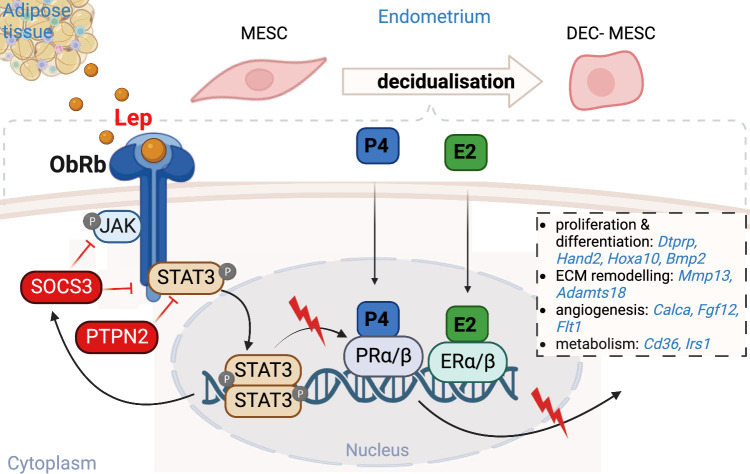Fig. 6.
Diagram representing the molecular orchestration of decidualisation and its dysregulation by SOCS3 and PTPN2 in obese mothers. Decidualisation is largely regulated by the steroid hormones progesterone (P4) and oestradiol (E2), which in association with the signal transducer and activator of the transcription 3 (STAT3) activate genes molecularly regulating decidualisation. In obese mothers, excessive levels of leptin bind to the leptin receptor b (ObRb), phosphorylating the Janus kinase 2 (JAK2) and STAT3 (pSTAT3), leading to the transcription of leptin signalling regulators like suppressor of cytokine signalling 3 (SOCS3), and protein tyrosine phosphatase non-receptor type 2 (PTPN2), known to inhibit pSTAT3. Decreased pSTAT3 levels disrupts the pSTAT3-P4 hub, which affects the expression of genes involved in cell proliferation and differentiation like prolactin family 8, subfamily a, member 2 (Dtprp), bone morphogenetic protein 2 (Bmp2), heart and neural crest derivatives expressed 2 (Hand2), and homeobox A10 (Hoxa10); extracellular matrix remodelling (ECM) as matrix metallopeptidase 13 (Mmp13), ADAM metallopeptidase with thrombospondin type 1 motif 18, (Adamts18); angiogenesis like calcitonin related polypeptide alpha (Calca), fibroblast growth factor 12 (Fgf12), Fms related receptor tyrosine kinase 1 (Flt1); and cell metabolism including CD36 molecule (Cd36), or insulin receptor substrate 1 (Irs1)

